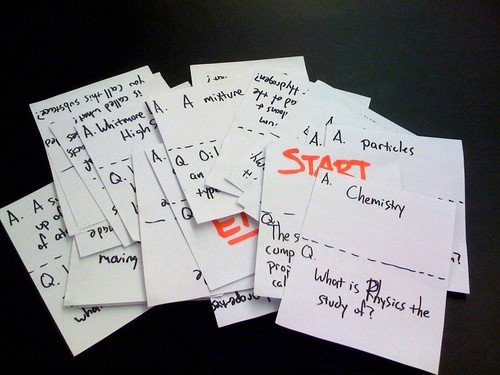Though I'm generally pretty averse to review games, I was inspired by a recent post about the effectiveness of Math Basketball. I do have one review that has been remarkably successful. I don't remember where I picked this one up, and I don't have a name for it. I'm open to witty suggestions.

The setup
- Go through the material you want students to review. Come up with several questions that get at that knowledge. Make sure you have at least as many questions as students. It's okay to have more.
- Throw in a few questions that students will really need to think through the knowledge to get the answer.
- Throw in a few simple definitions.
- Throw in a few totally unrelated questions about yourself or anything else.
- What is Mr. W's favorite slapstick comedy movie?
- Who is Mr. W's favorite super-hero?
- What is the greatest baseball team in the history of the world?
- Put the first question on the bottom half of a note card. On a second note card, put the answer to the first question on the top of the card. Put a second question on the bottom of that note card. Continue filling out note cards like this until you've used up all your questions.
- I always write "START" and "END" in big red letters on the first and last cards, just for clarity.
In class
- Pass out at least one card to each student.
- As soon as the person with the first card starts reading the question, start a timer. Be sure you're using one that measures down to hundredths of a second. Your students will want that type of accuracy. Trust me.
- As soon as the person with the last card is finished reading the last answer stop the time.
Regulations & tips
- The entire question and answer must be read out loud.
- No reading an answer until the entire question has been read.
- I only allow students to run through the activity twice with the same cards. After the second time, I collect the cards, shuffle them up, and pass them back out.
- You'll probably want a list of the questions, in order, sitting in front of you. The first time through there's can be lots of wrong answers read. I just say, "Nope!" when a wrong answer is read.
- Really devious intelligent classes have been known to purposely try skipping a few cards to improve their times, hoping to catch me off guard. Be on guard.
Modes of play
- Class vs. class. Classes compete for the lowest overall time. I don't tell my classes the time they have to beat. Instead, at the end of the activity I do a reality show style reveal of the best time so far.
- Class vs. clock. Set an arbitrary time to beat. Pick low. I've had classes go through sets of cards faster than I would've ever imagined possible. In my wily experience, I generally don't set a time to beat until they've gone through two reshuffles. That way I have a better idea of what will be a good goal for the class.
Compensation
In the past I've given extra credit to classes for having the lowest overall time or besting their goal (depending on the mode of play). However, my first time through it at my new school I tried it out with no other reward than bragging rights, just to see how it would go (I knew once I offered extra-credit, they'd never play for anything less). Results? It went great. Bragging rights proved a big enough motivator this time around.
